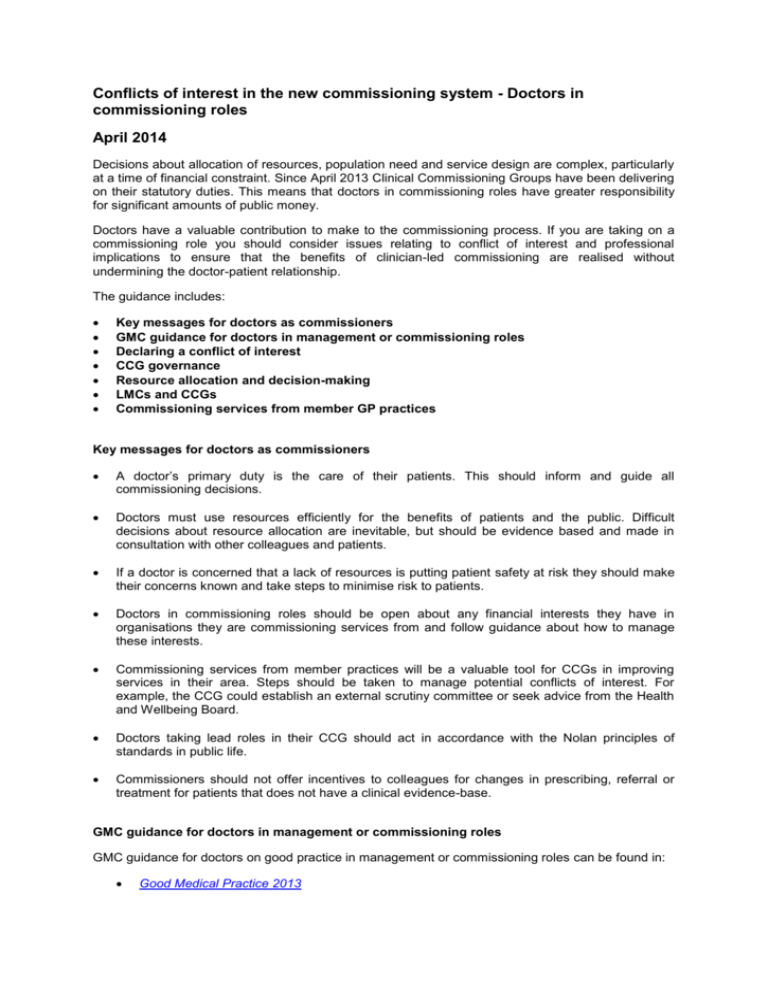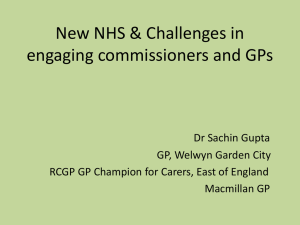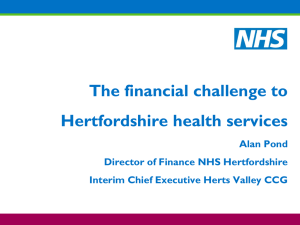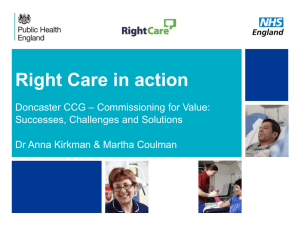Doctors as commissioners
advertisement

Conflicts of interest in the new commissioning system - Doctors in commissioning roles April 2014 Decisions about allocation of resources, population need and service design are complex, particularly at a time of financial constraint. Since April 2013 Clinical Commissioning Groups have been delivering on their statutory duties. This means that doctors in commissioning roles have greater responsibility for significant amounts of public money. Doctors have a valuable contribution to make to the commissioning process. If you are taking on a commissioning role you should consider issues relating to conflict of interest and professional implications to ensure that the benefits of clinician-led commissioning are realised without undermining the doctor-patient relationship. The guidance includes: Key messages for doctors as commissioners GMC guidance for doctors in management or commissioning roles Declaring a conflict of interest CCG governance Resource allocation and decision-making LMCs and CCGs Commissioning services from member GP practices Key messages for doctors as commissioners A doctor’s primary duty is the care of their patients. This should inform and guide all commissioning decisions. Doctors must use resources efficiently for the benefits of patients and the public. Difficult decisions about resource allocation are inevitable, but should be evidence based and made in consultation with other colleagues and patients. If a doctor is concerned that a lack of resources is putting patient safety at risk they should make their concerns known and take steps to minimise risk to patients. Doctors in commissioning roles should be open about any financial interests they have in organisations they are commissioning services from and follow guidance about how to manage these interests. Commissioning services from member practices will be a valuable tool for CCGs in improving services in their area. Steps should be taken to manage potential conflicts of interest. For example, the CCG could establish an external scrutiny committee or seek advice from the Health and Wellbeing Board. Doctors taking lead roles in their CCG should act in accordance with the Nolan principles of standards in public life. Commissioners should not offer incentives to colleagues for changes in prescribing, referral or treatment for patients that does not have a clinical evidence-base. GMC guidance for doctors in management or commissioning roles GMC guidance for doctors on good practice in management or commissioning roles can be found in: Good Medical Practice 2013 Financial and commercial arrangements and conflicts of interest Leadership and management for all doctors 2012. Good Medical Practice provides brief guidance on conflicts of interest in paragraphs 78 and 79: “78 You must not allow any interests you have to affect the way you prescribe for, treat, refer or commission services for patients. 79 If you are faced with a conflict of interest, you must be open about the conflict, declaring your interest formally, and you should be prepared to exclude yourself from decision making” Leadership and management for all doctors 2012 is recent GMC guidance for doctors in leadership roles. The guidance includes advice on managing resources, developing services and dealing with concerns. Financial and commercial arrangements and conflicts of interest contains specific sections on commissioning services, incentives and inducements and conflicts of interest. The main points of the GMC guidance are: The GMC recognises that both actual and perceived conflicts of interest can undermine trust. Commissioners must take steps to manage any perceived or actual conflict of interest. Commissioning decisions must be fair, transparent and comply with the law. Commissioners must make sure they are fully up to date with relevant guidance and protocols governing the commissioning process. Doctors must use resources efficiently for the benefits of patients and the public. Declaring a conflict of interest NHS England’s guidance stresses that potential or perceived conflicts of interest can be as damaging as actual conflicts of interest. If a doctor is aware of a conflict of interest, or is unsure if a conflict exists, they should declare this as early as possible to all those affected. Doctors should ensure they are familiar with the formal procedures and policies to deal with conflicts of the organisations they are involved with. The GMC acknowledges that conflicts may not always be avoidable. For example, it is essential that CCGs are able to commission community-based services (previously called ‘Local Enhanced Services’) from member practices, but GPs involved in these decisions will be conflicted if their own practices are commissioned to provide these services. Robust mechanisms to deal with conflicts of interest, including open and transparent decision-making, will help mitigate risks (further discussion of CCGs commissioning services from their member practices can be found below). The GMC guidance is clear that conflicts are not confined to financial interests but can include other personal interests. The BMA recommends that doctors are as open as possible about the changes to the commissioning bodies and how they are involved with their CCG, whether they are a CCG lead or just a member of a CCG through their practice. In particular, patients may have concerns that their doctor’s involvement in commissioning will influence what happens when they visit their doctor. CCG governance CCGs are statutory bodies with responsibility for large amounts of public money. The Health and Social Care Act and secondary legislation requires CCGs to have good governance structures and transparent decision-making processes. All doctors with leadership roles in their CCG should familiarise themselves with their CCG constitution and with the statutory governance requirements of CCGs and NHS England’s guidance ‘Managing conflicts of interest: Guidance for Clinical Commissioning Groups’. This guidance discusses the governance of CCGs, the statutory responsibilities CCGs must fulfil and provides advice for CCGs on managing conflicts of interest. CCGs are required by law to publish and maintain a register of conflicts of interest of the member practices of the CCG, members of the CCG’s committees and all CCG employees. NHS England’s guidance details how CCGs should maintain a register of interests. The BMA recommends that CCGs update this register every three months and this recommendation is echoed in NHS England’s guidance. This register should also be freely available to the public and CCGs need to consider how to ensure that all those who request to view the register are able to. The NHS England guidance states that an individual with a ‘material interest’ in an organisation which provides or ‘is likely to provide substantial business’ to a CCG (and this encompasses commissioning support services) should not be a member of the governing body. The BMA view is that equity interest in a business of more than 5% should be considered a ‘material interest’. Resource allocation and decision-making When making decisions about services, doctors must familiarise themselves with local and national policies governing access to particular treatment, for example NICE guidelines. Resources for healthcare are limited and so difficult decisions about priorities are inevitable. Doctors involved in commissioning should involve other medical colleagues, health professionals, patients and the public in an open and honest discussion about the decisions that need to be taken. Decisions about resource allocation should be evidence based and non-discriminatory. The GMC recommends that where a doctor is concerned that commissioning or management role may conflict with a doctor’s primary duty to their patients, they should: Ask for advice from colleagues Be open about conflicts of interest Seek external advice from professional or regulatory bodies As well as ensuring that CCGs are robust and transparent organisations, doctors taking lead roles in their CCG should also act on accordance with the Nolan principles of standards in public life: Selflessness: Holders of public office should take decisions solely in terms of the public interest. They should not do so in order to gain financial or other material benefits for themselves, their family, or their friends. Integrity: Holders of public office should not place themselves under any financial or other obligation to outside individuals or organisations that might influence them in the performance of their official duties. Objectivity: In carrying out public business, including making public appointments, awarding contracts, or recommending individuals for rewards and benefits, holders of public office should make choices on merit. Accountability: Holders of public office are accountable for their decisions and actions to the public and must submit themselves to whatever scrutiny is appropriate to their office. Openness: Holders of public office should be as open as possible about all the decisions and actions that they take. They should give reasons for their decisions and restrict information only when the wider public interest clearly demands. Honesty: Holders of public office have a duty to declare any private interests relating to their public duties and to take steps to resolve any conflicts arising in a way that protects the public interest. Leadership: Holders of public office should promote and support these principles by leadership and example. Local Medical Committees and CCGs Local Medical Committees (LMCs), as the statutory representatives of the local profession, should be closely involved with their local CCGs. This involvement may vary from area to area, however the BMA is strongly of the view that while LMC involvement with the CCG is absolutely essential, LMC officers should not hold formal office on their CCG board. Examples of appropriate LMC involvement include: The CCG makes a commitment to formally consult the LMC on all pertinent issues. This is potentially far more time-consuming than if the following two options. It also requires the CCG to provide a definition of the issues warranting LMC involvement The LMC is given a non-voting seat on the CCG Board The LMC is given an observer seat on the CCG Board. Whilst this enables the LMC to keep abreast of CCG developments, a downside is that they are unable to contribute to discussions. Commissioning services from member GP practices CCGs have a statutory responsibility to assist the NHS England to improve the quality of primary care in their area. CCGs will be able to commission services currently commissioned as Local Enhanced Services as part of this statutory responsibility. These services will be called ‘community-based services’ and will be commissioned by CCGs using the NHS Standard Contract. Public health related community-based services will be commissioned by local authorities, who can chose to use the Department of Health published Public Health Services Contract). More information about the Standard Contract and the Public Health Services Contract here. Community based services are an important lever to drive up quality, improve services and help CCGs achieve QIPP objectives. It is important that there are robust mechanisms in place to enable CCGs to commission these services whilst avoiding perceived or actual conflict. Many services currently commissioned as LESs have low contract value which does not reach the threshold for competitive tender. NHS England procurement guidance for CCGs should be read in conjunction with other legislation that impacts on the procurement decisions a CCG makes, such as the NHS (Procurement, Patient Choice and Competition) Regulations (2013). Subject to procurement and competition law and policy, CCGs may have some autonomy in deciding what procurement processes to use. For example, under limited circumstances, a CCG may chose to use single tender. Useful links BMA guidance on procurement processes, including competitive tender, single tender and Any Qualified Provider. However, NHS England guidance on commissioning services from member practices suggests that competitive tender may help to guard against conflict interest. The reason for this is that there are clear rules governing procurement processes, including requirements around advertisement of services put out to competitive tender. As a result, the process is transparent and open to scrutiny. Useful links NHS England guidance for CCGs on procurement. Information about commissioning of services currently commissioned as Local Enhanced Services (NHS England website). NHS England guidance provides advice for CCGs commissioning services from member practices. CCGs should familiarise themselves with this guidance. In addition, CCGs should consider mechanisms to deal with potential conflicts where a contract may be awarded to member practices or another provider in which governing board members may have an interest. These mechanisms will be useful in managing conflict of interest whatever procurement process is used and will provide reassurance that such decisions have been made in the best interests of patients. Such mechanisms could include: Establishing an external CCG scrutiny committee to oversee CCG decision-making This body could include lay members, representatives from member practices, clinicians from other CCGs, public health doctors, the Health and Wellbeing Board and the NHS England Area Team. CCGs could share a Scrutiny Committee to ensure external and independent input into decision-making, a robust approach across geographies and to avoid duplication. Seeking advice from the Health and Wellbeing Board Health and Wellbeing Boards have a role in the oversight of the commissioning of health services. The Health and Wellbeing Board will also produce the Joint Strategic Needs Assessment and Joint Health and Wellbeing Strategy for their area and so will have a good overview of the needs and priorities of local populations. As such, CCGs could usefully consult the Health and Wellbeing Board where they require independent but informed oversight of a commissioning decision. Seeking advice from the NHS England Area Team NHS England commission primary care and the NHS England’s Area Teams will have responsibility for primary care contracts at a local level. Technically, a CCG’s ability to commission services from general practice is an authority delegated from NHS England. It may be appropriate in some instances for CCGs to ask the Area Team for external oversight of a commissioning decision. Seek professional legal advice on procurement and competition Primary care incentive schemes CCGs have taken on their commissioning responsibilities at a time of huge financial pressure. A number of primary care incentive schemes designed to achieve QIPP objectives through a reduction in referrals or prescribing activity have been brought to the attention to the BMA in recent months. The BMA has significant concerns about the professional and ethical implications of these schemes. Three examples: A scheme rewarding practices in the top 25% of outpatient referrers to reduce their referral rate per 1,000 population by 10% or to the 75th quartile where clinically appropriate. No assessment of whether the reduction in referrals was achieved through clinically appropriate means. Practices to be paid £1 per head to achieve the reduction in referrals with no restrictions on how this money is spent. A scheme rewarding practices for an arbitrary 5% reduction in referrals to Accident and Emergency and non-elective admissions. A scheme rewarding practices for referring fewer patients to outpatient appointments or for elective procedures by diverting them to community or primary care settings instead. Payments proposed to be made to individual practices based on the level of savings achieved with ‘very few’ restrictions on how the money can be used. The BMA urges any doctor considering commissioning or participating in an incentive scheme to consider the schemes carefully. Any GP with concerns about a proposed incentive scheme should seek advice from their Local Medical Committee. The GMC recommends that doctors should, where possible, review the evidence base for the schemes and should satisfy themselves that in participating, they will not be compromising patient care. The GMC could take action against doctors participating in or commissioning incentive schemes that are deemed to breach a doctor’s duties as outlined in Good Medical Practice. Commissioning strategies should use NHS resources responsibly and unnecessary or inappropriate referrals should be avoided. Designed appropriately, initiatives can improve patient care whilst enabling investment in service through resourcing process and rewarding beneficial outcomes, such as in QOF and many prescribing incentive schemes. However, the types of scheme outlined above raise serious ethical and professional concerns. Some of the schemes we have seen appear to reward arbitrary reductions in clinical activity without evidence that this is in the best clinical interests of individual patients and sometimes with no restrictions on how this incentive is used. Key messages for doctors commissioning an incentive scheme: All doctors have a responsibility to use NHS resources responsibly; this is particularly pertinent for doctors with commissioning responsibilities. However, decisions about allocation of resources must be based on clinical evidence and be fair and transparent. Doctors commissioning incentive schemes should satisfy themselves that the scheme is based on clinical evidence. Commissioners should be satisfied that the scheme does not constitute an inducement to others that may affect, or be seen to affect, the way they treat patients (see paragraph 80 of Good Medical Practice). Key messages for doctors participating in an incentive scheme: Doctors should satisfy themselves that any incentive scheme does not constitute an inducement that may affect, or be seen to affect, the way they treat patients (see paragraph 80 of Good Medical Practice). Doctors participating in a scheme should satisfy themselves that the scheme is based on clinical evidence. GMC guidance states that doctors should raise concerns if they think patient safety is compromised by an incentive scheme. Incentive schemes MUST: Incentive schemes MUST NOT: Have good clinical evidence; Change clinical activity without a sound evidence base; Be of benefit to a community of patients or to individual patients; Compromise patient safety; Encourage a uniform or blanket approach to all patients with the same condition; Directly reward decisions relating to individual patients. Ensure that patients continue to receive the clinical care to meet their individual needs; Reward decisions or outcomes for large groups or populations of patients; Ensure that payments arising from the scheme are used to improve patient services.






